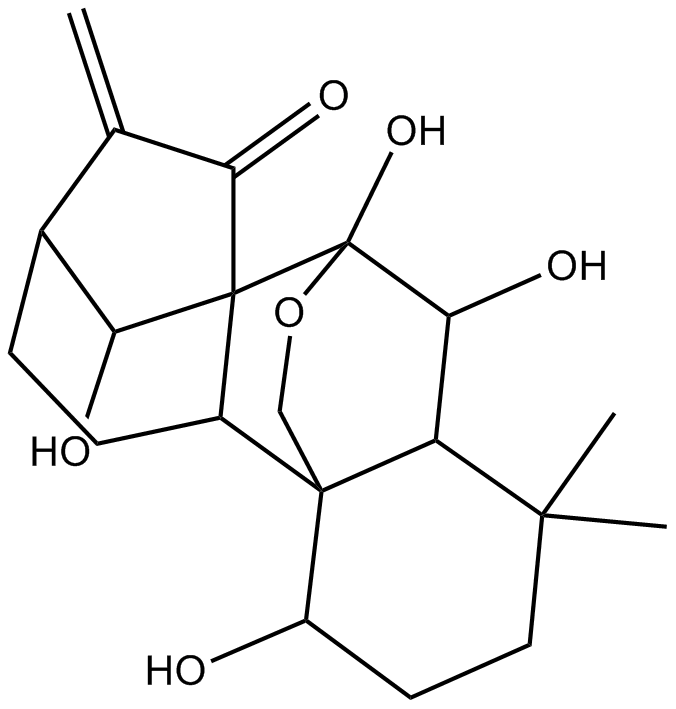Oridonin (Synonyms: NSC 250682) |
| Catalog No.GN10692 |
A diterpenoid with anti-inflammatory and anticancer properties
Products are for research use only. Not for human use. We do not sell to patients.

Cas No.: 28957-04-2
Sample solution is provided at 25 µL, 10mM.
Oridonin (NSC-250682), a diterpenoid isolated from Rabdosia rubescens, acts as an inhibitor of AKT, with IC50s of 8.4 and 8.9 μM for AKT1 and AKT2; Oridonin possesses anti-tumor, anti-bacterial and anti-inflammatory effects.
Oridonin is an ATP-competitive inhibitor of AKT with IC50s of 8.4 and 8.9 μM for AKT1 and AKT2, respectively. Oridonin (5, 10 or 20 μM) obviously inhibits the growth of KYSE70, KYSE410 and KYSE450 ESCC cells via targeting AKT1/2. Oridonin (10 or 20 μM) causes G2/M phase cell cycle arrest in KYSE70, KYSE410 and KYSE450 cells, and induces apoptosis in these three cell lines at 20 μM. In addition, Oridonin (5, 10 or 20 μM) in combination with cisplatin or 5-FU enhances the inhibition of esophageal squamous cell carcinoma (ESCC) cell growth[1]. Oridonin (0.1 and 1 μM) preferentially suppresses AKT/mTOR signaling. Oridonin (1 μM) also selectively suppresses growth of breast cancer cells with hyperactivation of AKT signaling[2].
Oridonin (160 mg/kg, p.o.) shows significant reduction in the tumor growth without obvious weigh loss in SCID mice bearing EG9 and HEG18 tumor cells. Oridonin treatment also suppresses the expression of Ki-67, phosphorylated AKT, GSK-3β or mTOR in mice[1]. Oridonin (15 mg/kg, i.p.) impairs cell growth in breast cancer with hyperactivation of AKT signaling in nude mice[2].
References:
[1]. Song M, et al. Targeting AKT with oridonin inhibits growth of esophageal squamous cell carcinoma in vitro and patient derived xenografts in vivo. Mol Cancer Ther. 2018 Apr 25. pii: molcanther.0823.2017.
[2]. Sun B, et al. Oridonin inhibits aberrant AKT activation in breast cancer. Oncotarget. 2018 Feb 1;9(35):23878-23889.
Average Rating: 5 (Based on Reviews and 30 reference(s) in Google Scholar.)
GLPBIO products are for RESEARCH USE ONLY. Please make sure your review or question is research based.
Required fields are marked with *




